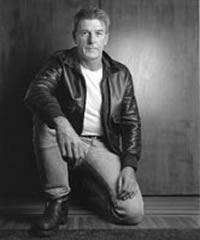

|

|
IN MEMORIAM
Thomson Gunn
Senior Lecturer in English, Emeritus
UC Berkeley
1929 – 2004
The renowned poet Thom Gunn, a former teacher of creative writing at the University of California, Berkeley, died April 25, 2004, of a heart attack at his home in San Francisco. He was 74.
A British expatriate educated formally at the University of Cambridge and Stanford University, Gunn emigrated to the West Coast in the 1950s, embraced the freedoms of the San Francisco counterculture, and made them the subject of much of his art. He taught at Berkeley from 1958 to 1966, gave up his tenured position in the Department of English (accounts say he “hated meetings”), then taught in the department as a lecturer for several decades, until 2000.
More rock star than professor in appearance, as one critic has described him, Gunn was a rigorous teacher with a larger-than-life persona in the classroom. David Gewanter, an associate professor of English at Georgetown University who earned his M.A. and Ph.D. at Berkeley, recalls a handsome and thin man with neatly pressed cowboy shirts, pointy boots, a small earring, and a massive tattoo on his forearm (“You’d see a bit of it, and never more”). “Thom was always polite, delighted at raucous jokes and banter, kept his silence but had a loud, boisterous voice…. He became a cult figure amongst the writers-manqué.”
Under his tutelage, students got “no free-verse circus,” but initially, at least, much “practice in strict verse forms” and encouragement in reaching for “clarity and spareness of poetic statement,” recalled Ralph Rader, professor emeritus of English. “His students appreciated his discipline and care and rated him very highly as a teacher.”
At home with formal rhyme as well as free verse, Gunn wrote of themes common to most poets — family, nature, friends — but also about LSD, bikers, the gay bathhouse scene, AIDS, rock stars, and serial killers. His students, likewise, were free to address a full range of subjects, though never to “take advantage of human stories for aesthetic effects” or to “‘score points’ off of people’s problems,” Gewanter recalls.
Gunn was born in Kent, England, in 1929, to journalist parents who divorced when he was nine. Six years later, his mother committed suicide by inhaling gas — an event he wrote of decades later in an autobiographical poem, “The Gas Poker.” After completing the British equivalent of high school, Gunn did two years of required service in the British army and lived in Paris for six months. In 1950, then a student at Cambridge’s Trinity College, he published his first poem, in a student magazine, and met his life partner, Mike Kitay, an American.
Gunn moved to the West Coast in 1954 — the same year he published his first collection — to work on a master’s degree at Stanford. He was hired at Berkeley four years later. “His moderate workday habits were ‘balanced,’” says Gewanter, by “an entirely wild nightlife, one that poked holes in — or simply stabbed — the lineaments of bourgeois life.” He never owned a car and rode the “F” bus between campus and San Francisco, where he lived for years in a communal household in the Haight and hung out with bikers, “non-belongers,” and “odd men out” — people he “humanized and made loveable” in his writing, says fellow poet Phillip Levine.
Perhaps his best known collection, The Man With Night Sweats (1992), is a tribute to friends touched by AIDS. According to Gewanter, “He held this stunning book in his drawer for 10 years, because he didn’t want to be without poems once this book came out. When he finally published it, he had two more manuscripts done.” In its title poem, Gunn wrote in the voice of an AIDS patient:
I have to change the bed,
But catch myself instead
Stopped upright where I am
Hugging my body to me
As if to shield it from
The pains that will go through me,
As if hands were enough
To hold an avalanche off.
Hardy, Stendhal, Baudelaire, and Sartre were early influences on Gunn’s work, as was his teacher at Stanford, Yvor Winters; he liked Ben Jonson as well as Robert Duncan. In all he published more than 30 volumes in the United States and England.
His admirers were many. Gunn won high honors on both continents — among them Britain’s £10,000 Forward Prize, the David Cohen British Literature Prize, and a MacArthur “genius” Fellowship. His reading audience has been said to be split, notes Gewanter, “between those who loved the formal rigor, those who appreciated the nobility and candor of gay life expressed, those who loved the radical sense of vision and experience from California, those who wanted more from the best formalist in English…. Those audiences are now united in being separated from him.”
Thom Gunn is survived by his partner, Mike Kitay; his youngest brother, Ander Gunn of Penzance, England; an aunt, and several nieces and nephews.
Cathy Cockrell
Office of Public Affairs